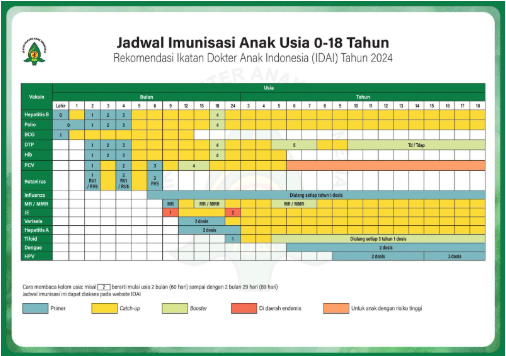By: Geraldus Sigap
The first year of life is a critical period for your baby’s health and development. Ensuring that your child receives the necessary vaccines during this time is one of the most important things you can do as a parent. Vaccines protect babies from a variety of serious diseases, helping to build their immune systems and keep them safe from infections that can be life-threatening. In 2024, the Indonesian Pediatric Society, or Ikatan Dokter Anak Indonesia (IDAI), has updated its vaccination schedule, highlighting the essential vaccines that every baby should receive in their first year. This guide will walk you through the recommended vaccines and explain why they are vital for your baby’s health.

Figure 1. Vaccination in baby
In 2024, IDAI has updated its vaccine schedule to provide comprehensive protection against a wide range of diseases. Here is an overview of the vaccines recommended for babies during their first year of life:
| Vaccine | Description | Timing |
| Hepatitis B Vaccine | Administered shortly after birth, this vaccine protects against Hepatitis B, a viral infection that affects the liver. It is crucial to give this vaccine within the first 24 hours of life to ensure early protection, especially for babies born to mothers with Hepatitis B. | Within the first 24 hours of life |
| BCG Vaccine | The Bacillus Calmette-Guérin (BCG) vaccine is usually given at birth or shortly after to protect against tuberculosis (TB), a serious lung infection. IDAI’s schedule continues to emphasize the importance of this early vaccine, as TB remains a health concern in many regions. | At birth or shortly after |
| Polio Vaccine (IPV/OPV) | Polio can cause paralysis and other severe complications. To protect your baby, IDAI recommends a series of polio vaccines: the inactivated polio vaccine (IPV) and the oral polio vaccine (OPV). The first dose is given at birth (OPV) and is followed by additional doses throughout the first year. | First dose at birth (OPV) |
| DTP Vaccine | This combination vaccine protects against diphtheria, tetanus, and pertussis (whooping cough). It is given in a series of doses starting at two months of age, with follow-up doses at four and six months. DTP is essential to prevent life-threatening respiratory infections and complications. | Starting at 2 months of age |
| Hib Vaccine | The Haemophilus influenzae type b (Hib) vaccine protects against bacterial infections that can lead to meningitis, pneumonia, and other serious illnesses. It is typically administered alongside the DTP vaccine at two, four, and six months of age. | At 2, 4, and 6 months of age |
| Pneumococcal Vaccine (PCV) | Pneumococcal disease can cause severe illnesses such as meningitis, sepsis, and pneumonia. The pneumococcal vaccine (PCV) is recommended at two, four, and six months to protect babies from these potentially deadly infections. | At 2, 4, and 6 months of age |
| Rotavirus Vaccine | Rotavirus is a common cause of severe diarrhea in infants. The oral rotavirus vaccine is given at two and four months to prevent this infection, which can lead to dehydration and hospitalization if left untreated. | At 2 and 4 months of age |
| Influenza Vaccine | Although not mandatory for all, the flu vaccine is recommended for infants over six months, especially if they are at higher risk of complications. IDAI advises parents to consider this vaccine to provide additional protection during flu season. | Over 6 months of age |
| Measles, Mumps, and Rubella (MMR) | This vaccine provides crucial immunity against measles, mumps, and rubella, which are contagious diseases that can cause severe complications. IDAI’s 2024 schedule suggests the first dose can be given as early as nine months, especially in areas with high rates of measles. | As early as 9 months of age |
The 2024 IDAI schedule emphasizes flexibility and early intervention to protect infants in their most vulnerable stage. For example, the earlier administration of the MMR vaccine in areas with higher risks highlights a proactive approach to combating outbreaks. Additionally, the schedule provides updated guidelines for administering combination vaccines, which allow multiple vaccines to be given in one shot, reducing the number of injections your baby needs.

Figure 2. Vaccination schedule from IDAI 2024
Vaccination appointments are essential in ensuring your baby remains on track with the recommended schedule. During these visits, your pediatrician will administer the vaccine and monitor your baby for any immediate reactions, which are generally mild and temporary, such as slight swelling or fever. Pediatricians also use these visits to check your baby’s overall health and development, making it an excellent opportunity for parents to discuss any concerns.
It is important to follow the schedule as closely as possible. Delays in vaccination can leave your baby vulnerable to diseases that are otherwise preventable. If you need to reschedule an appointment, be sure to do so promptly to keep your baby protected.
Parents often have concerns about the safety of vaccines, and it is completely natural to seek information. Vaccines recommended by IDAI are extensively tested for safety and effectiveness. They undergo rigorous clinical trials before approval and are monitored continuously after they become part of the vaccination schedule. Side effects, if any, are usually mild and short-lived, such as a slight fever or soreness at the injection site. Severe reactions are extremely rare, and the benefits of vaccination far outweigh the risks. By vaccinating your baby, you are not only protecting them but also contributing to herd immunity, which helps protect other children and vulnerable individuals in the community.
RS Abdi Waluyo’s pediatric department is equipped with modern facilities, ensuring a clean, safe, and comfortable environment for your child’s vaccination visits. Our pediatricians are experts in administering vaccines, monitoring your baby’s response, and offering post-vaccination care. In addition, we provide reminders for upcoming vaccinations to help you stay on track and keep your baby protected.
If you are a parent or caregiver, it is important to stay informed about the vaccine schedule and work closely with your pediatrician to ensure your baby receives the necessary shots at the right times. At RS Abdi Waluyo, our pediatric team is ready to support you through each step of the vaccination journey, providing expert care and guidance tailored to your baby’s needs. Contact us today to schedule your baby’s next vaccination appointment and give them the best chance at a healthy start.
Resources
- What Vaccines Does Your Newborn Need? [Homepage on the Internet]. Parents. [cited 2024 Oct 22];Available from: https://www.parents.com/baby/health/vaccinations/the-newborn-vaccines-your-baby-needs/
- imuni A. Jadwal Vaksinasi Anak IDAI Terbaru 2024 [Homepage on the Internet]. imuni. 2024 [cited 2024 Oct 22];Available from: https://imuni.id/jadwal-vaksinasi-anak-idai-terbaru-2024/
- Schedule C on the A of S of HOR to the RCI, Practice B on PH and PH, Medicine I of. Summary [Homepage on the Internet]. In: The Childhood Immunization Schedule and Safety: Stakeholder Concerns, Scientific Evidence, and Future Studies. National Academies Press (US), 2013 [cited 2024 Oct 22]; Available from: https://www.ncbi.nlm.nih.gov/books/NBK206938/
- Ginglen JG, Doyle MQ. Immunization [Homepage on the Internet]. In: StatPearls. Treasure Island (FL): StatPearls Publishing, 2024 [cited 2024 Oct 22]; Available from: http://www.ncbi.nlm.nih.gov/books/NBK459331/
